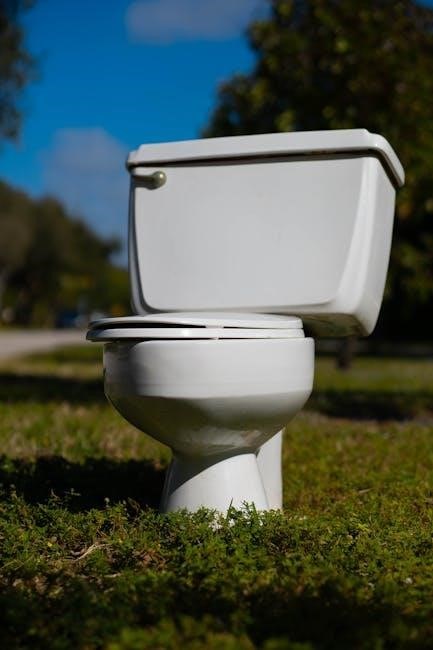The Florida Plumbing Code regulates plumbing systems, ensuring safety, efficiency, and compliance with state standards. It outlines requirements for water supply, sewage, and fixtures, updated in 2020 and 2023.
1.1 Overview of the Florida Plumbing Code
The Florida Plumbing Code is a comprehensive regulatory document governing plumbing systems across the state. It ensures safe, efficient, and sanitary installation of water supply, sewage, and drainage systems. Updated in 2020 and 2023, the code incorporates modern standards, addressing materials, fixtures, and environmental considerations. Compliance is mandatory for all plumbing professionals and projects in Florida.
1.2 Importance of the Plumbing Code in Florida
The Florida Plumbing Code is crucial for maintaining public health, safety, and environmental protection. It ensures safe water supply, proper waste disposal, and compliance with modern standards. By adhering to the code, professionals prevent hazards, reduce legal risks, and contribute to sustainable infrastructure. Its enforcement safeguards communities, making it a cornerstone of Florida’s construction and plumbing regulations.

History and Development of the Florida Plumbing Code
The Florida Plumbing Code evolved from earlier editions, with significant updates in 2020 and 2023. It is adapted from the International Plumbing Code, tailored to Florida’s unique needs, ensuring safety and compliance through periodic revisions.
2.1 Evolution of Plumbing Codes in Florida
The Florida Plumbing Code has evolved significantly over decades, adapting to technological advancements and regional challenges. Early versions focused on basic safety standards, while modern updates incorporate energy efficiency, water conservation, and disaster resilience. The 2020 and 2023 editions introduced substantial changes, reflecting Florida’s unique environmental conditions and compliance with national standards to ensure public health and safety.
2.2 Key Updates in Recent Editions (2020 and 2023)
The 2020 and 2023 Florida Plumbing Code editions introduced significant updates, including enhanced water efficiency standards, revised cross-connection control measures, and improved provisions for water heaters and greywater systems. The 2023 edition also added specific requirements for backflow prevention and updated testing protocols, ensuring alignment with modern safety and environmental regulations to protect public health and infrastructure integrity.

Key Provisions of the Florida Plumbing Code
The Florida Plumbing Code establishes standards for water supply systems, sewage disposal, and specific fixtures. It ensures safe installations, protects water quality, and mandates regular inspections for compliance.
3.1 Water Supply Systems and Requirements
The Florida Plumbing Code mandates water supply systems to ensure potable water quality and safety. Regulations cover materials, sizing, and installation of pipes, valves, and fixtures. It specifies pressure requirements and protection against contamination. Cross-connections and backflow prevention devices are emphasized to safeguard public health. Compliance with these standards is critical for all plumbing installations in Florida.
3.2 Sewage Disposal and Drainage Systems
The Florida Plumbing Code establishes standards for sewage disposal and drainage systems to prevent contamination and ensure proper flow. It mandates the use of traps, vent pipes, and cleanouts to maintain system integrity. Regulations also address the design and installation of sewer lines, ensuring compliance with health and safety requirements. Proper sizing and material specifications are emphasized to prevent backups and protect public health.
3.3 Specific Plumbing Fixtures and Appliances
The Florida Plumbing Code sets standards for plumbing fixtures and appliances, ensuring water efficiency and safety. Requirements include proper installation of toilets, sinks, and faucets, with water-saving specifications. Appliances like dishwashers and water heaters must meet energy and safety standards. The code also addresses backflow prevention and venting systems to maintain water quality and prevent contamination, ensuring compliance with health regulations. Regular updates reflect advancing technologies and environmental goals.
Enforcement and Compliance
Local authorities enforce the Florida Plumbing Code, conducting inspections to ensure adherence. Non-compliance results in penalties, emphasizing the importance of proper installation and documentation to avoid violations.
4.1 Role of Local Authorities in Enforcement
Local authorities play a crucial role in enforcing the Florida Plumbing Code by conducting regular inspections and ensuring compliance. They verify that all plumbing systems meet the state’s standards, addressing violations promptly. Their oversight ensures public safety and maintains the integrity of plumbing infrastructure across the state.
4.2 Inspection Requirements for Plumbing Systems
Inspections ensure compliance with the Florida Plumbing Code, focusing on water supply, sewage systems, and fixtures. They verify proper installation, safety, and functionality. Regular checks prevent contamination risks and maintain system efficiency, safeguarding public health and infrastructure integrity across the state.
Accessing the Florida Plumbing Code PDF
Access the Florida Plumbing Code PDF through official sources like the Florida Building Code website. The 2023 edition is available for download, ensuring compliance with updated regulations.
5.1 Official Sources for the PDF Version
The official Florida Plumbing Code PDF is available through the Florida Building Commission and approved distributors. Visit the Florida Building Code website to access the 2023 edition directly, ensuring authenticity and compliance with state regulations. Additional resources may be found on platforms like Public.Resource.Org, which hosts official documents for public access.
5.2 How to Navigate the Document
The Florida Plumbing Code PDF is structured with clear chapters and sections for easy navigation. Use the table of contents to locate specific topics quickly. The index provides rapid access to key terms and code references. Appendices offer supplementary guidance, while updated sections highlight changes from previous editions. Understanding Chapter 1 and Section 101 is crucial for compliance. Utilize bookmarks and search functions in the PDF for efficient navigation. Each edition includes a summary of changes to guide users through updates.
Amendments and Revisions
The Florida Plumbing Code undergoes regular updates to reflect industry advancements. The 2023 edition integrates changes for clarity, while earlier versions like the 2020 edition introduced significant revisions.
6.1 Process for Updating the Code
The Florida Plumbing Code updates involve a structured process, including stakeholder feedback, committee reviews, and public hearings. Changes are proposed to enhance safety, align with new technologies, and address local needs. The Florida Building Commission oversees the process, ensuring revisions are thoroughly vetted before publication in new editions, such as the 2020 and 2023 updates.
6.2 Notable Changes in the 2023 Edition
The 2023 Florida Plumbing Code introduces updates to water conservation standards, expands requirements for water heater efficiency, and clarifies rules on greywater systems. Provisions for backflow prevention and seismic protection are enhanced. Additionally, new guidelines for pipe material compatibility and improved accessibility in plumbing fixtures ensure compliance with modern safety and environmental standards.
Training and Certification
Plumbing professionals in Florida must meet licensing requirements and complete continuing education to stay updated on code changes, ensuring compliance and high standards of practice.
7.1 Plumbing Licensing Requirements in Florida
In Florida, plumbing professionals must obtain proper licensing through the Department of Business and Professional Regulation (DBPR). Licenses are categorized into residential and commercial, requiring exams, experience, and fees. Continuing education is mandated to maintain certification and stay updated on code changes, ensuring adherence to safety and legal standards outlined in the Florida Plumbing Code.
7.2 Continuing Education for Plumbers
Florida requires licensed plumbers to complete continuing education courses to maintain certification. These courses cover updates to the Florida Plumbing Code, safety protocols, and best practices. Typically, 14 hours of education are mandated every two years, ensuring professionals stay informed about code revisions and industry advancements, promoting compliance and public safety.
Violations and Penalties
Violations of the Florida Plumbing Code can result in fines and legal action. Penalties are enforced by local authorities to ensure compliance and protect public health and safety.
8.1 Consequences of Non-Compliance
Non-compliance with the Florida Plumbing Code can lead to significant penalties, including fines, legal action, and suspension of permits. Repeat violations may result in higher penalties and mandatory corrections; Authorities enforce these measures to protect public health and ensure safe, efficient plumbing systems across the state.
8.2 How to Avoid Common Violations
To avoid violations, ensure all plumbing work adheres to the Florida Plumbing Code. Regular inspections, proper material usage, and staying updated on code changes are essential. Consulting licensed professionals and maintaining detailed documentation can also prevent issues. Compliance ensures safety, avoids penalties, and safeguards public health.
Comparison with Other State Codes
Florida’s Plumbing Code aligns with national standards but includes state-specific requirements, reflecting local environmental and structural needs, differing from other states’ codes in key areas like water conservation.
9.1 Differences Between Florida and National Codes
The Florida Plumbing Code adapts national standards to address the state’s unique environmental and structural needs, such as hurricane resistance and coastal erosion. It includes stricter water conservation measures and drainage requirements tailored to Florida’s climate. Local amendments ensure compliance with regional challenges, differing from national codes in areas like water supply protection and sewage disposal systems.
9.2 Unique Aspects of Florida’s Plumbing Code
Florida’s Plumbing Code includes unique requirements tailored to its subtropical climate and coastal regions. It mandates specific water conservation measures, hurricane-resistant plumbing systems, and enhanced protections for coastal areas. The code also addresses regional challenges like high water tables and saltwater intrusion, ensuring public health and safety through stringent regulations for water supply and sewage systems.

Future Trends and Developments
Future trends in the Florida Plumbing Code may focus on water conservation, smart plumbing systems, and sustainable materials. These updates aim to enhance efficiency and environmental compatibility.
Advancements in leak detection and automated systems are expected to improve maintenance and reduce water waste, aligning with Florida’s goals for long-term sustainability and resource management.
10.1 Emerging Technologies in Plumbing Systems
Emerging technologies in plumbing systems include smart sensors, IoT devices, and automated controls. These innovations enhance water conservation, leak detection, and system efficiency, aligning with Florida’s sustainability goals.
Advanced materials like PEX piping and greywater recycling systems are gaining traction. These technologies reduce water waste and improve system durability, expected to be integrated into future code updates.
10.2 Expected Changes in Upcoming Editions
Future editions of the Florida Plumbing Code are expected to focus on water efficiency, smart technologies, and sustainability. Updates may include stricter requirements for low-flow fixtures and greywater systems.
Anticipated changes also involve enhanced provisions for seismic-resistant plumbing and updated standards for drain and vent systems. These revisions aim to align with modern environmental and safety goals.
Importance of the Code for Professionals
The Florida Plumbing Code is crucial for professionals as it ensures adherence to safety standards, guiding plumbers and contractors in compliant practices that protect public health and safety.
11.1 Benefits for Plumbers and Contractors
The Florida Plumbing Code provides clear guidelines, ensuring plumbers and contractors adhere to safety and efficiency standards. Compliance enhances professionalism, builds client trust, and reduces legal risks. Updated editions offer improved practices, aligning with modern technologies and materials, while fostering consistency across projects. Adherence to the code also streamlines inspections, minimizing delays and ensuring system reliability.
11.2 Role of the Code in Ensuring Public Safety
The Florida Plumbing Code ensures public safety by setting strict standards for water quality, sewage disposal, and system design. It mandates regular inspections and adherence to safety protocols, reducing risks of contamination and hazards. Compliance with the code protects communities from health threats, ensuring reliable and safe plumbing systems statewide.

Digital Access and Resources
The Florida Plumbing Code PDF is accessible via official sources, offering digital convenience. Supplementary guides and resources support compliance and understanding of the code requirements.
12.1 Online Platforms for the Florida Plumbing Code PDF
The Florida Plumbing Code PDF is available on official platforms like the Florida Building Code website and the International Code Council portal. These platforms ensure easy access to the most recent editions, including the 2023 update. Users can navigate these websites to download or view the document, ensuring compliance with the latest regulations and standards.
12.2 Supplementary Materials and Guides
Supplementary materials, such as cross-references and checklists, complement the Florida Plumbing Code PDF. These resources, available on official websites, provide clarity on complex requirements and ensure compliance. Guides often include diagrams, installation tips, and interpretations of code updates, helping professionals navigate the 2023 edition effectively and stay informed about best practices and regulatory changes.
The Florida Plumbing Code PDF is essential for ensuring safe and efficient plumbing systems. Adherence to its guidelines is crucial for compliance, safety, and environmental protection, making it a cornerstone for professionals and regulators alike.
13.1 Summary of Key Points
The Florida Plumbing Code PDF provides comprehensive guidelines for plumbing systems, covering water supply, sewage, and specific fixtures. It ensures safety, efficiency, and compliance with state standards. Regular updates, such as the 2020 and 2023 editions, incorporate new technologies and practices. The code is enforced by local authorities, requiring inspections and adherence to strict regulations. Professionals must stay informed to maintain compliance and public safety.
13.2 Final Thoughts on Compliance and Best Practices
Compliance with the Florida Plumbing Code PDF is essential for ensuring public safety and avoiding penalties. Professionals must stay updated on the latest editions and adhere to local enforcement requirements. Best practices include regular inspections, proper installation of fixtures, and following guidelines for water supply and sewage systems. Adherence ensures efficiency, safety, and compliance with state regulations.